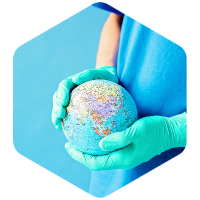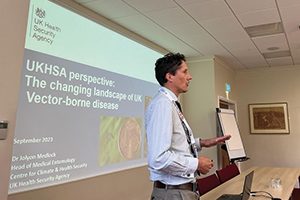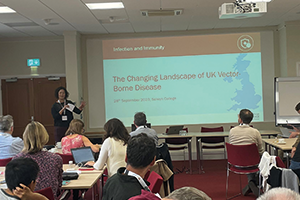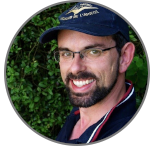
Growing human populations, environmental shifts and increasing international movement are the recognisable features of our changing world, and are contributing factors to the emergence, resurgence, and redistribution of many infectious diseases. Cambridge researchers are working across disciplinary boundaries to understand how pathogens are responding to our changing world. Working collaboratively and in partnership with affected communities, we will deliver effective strategies to protect our planetary health and the global community across future generations.
Scientific Collaboration and Partnerships
An initial meeting in March 2023 was organised in partnership with Cambridge Infectious Diseases and Cambridge Zero, on "Evidence-based solutions to the impact of climate change on emerging diseases. The goal of the meeting was to identify challenges for multisectoral research projects at the interface of environmental science, conservation and epidemiology. The workshop included scientists, policy makers, community leaders, NGOs and charities.
Following discussions in the first meeting, a second event took place in September 2023 focussed on ‘The Changing Landscape of UK Vector Borne Disease’, bringing together 43 researchers from across 16 University Departments and Institutes, as well as representatives from the Pirbright Institute, UK Health Security Agency, the Animal and Plant Health Agency and the British Trust of Ornithology. This meeting explored the emerging (and re-emerging) threat of vector borne diseases, particularly in response to climate change, which is altering the distribution and behaviour of disease transmitting vectors, such as mosquitoes and ticks.
A third meeting was held in December 2023 focussing on how approaches from different disciplines can best be utilised to tackle epidemic threats. Speakers and attendees from 7 Departments engaged in discussions on epidemic preparedness, exploring diverse perspectives from multiple disciplines, and established an interdisciplinary collaborative network of expertise in this area.
Delivering meaningful solutions to arising infectious disease challenges requires partnership and engagement with communities and researchers in the areas that are most affected, which are often in the Global South. We are working with researchers across Cambridge to exchange knowledge and experience in global infectious disease research and will be supporting more Cambridge colleagues to initiate equitable research programmes with partners in the Global South.


The Changing Landscape of UK Vector Borne Disease, September 2023
Public Awareness and Engagement
Following the pandemic, and in the ever-present shadow of climate change, it is timely that researchers across Cambridge work to engage the public in discussions on how pathogens and infectious disease are changing, what the impact on global health might be, and what mitigation measures we might be able to put in place in response.
We were pleased to deliver a series of events and activities as part of the Cambridge Festival 2023, where we shared our science and ideas with the public, through hands-on activities, seminars and more. Read more about 'Changing Pathogens in a Changing World' at the Cambridge Festival 2023.
Key Collaborators
Kate Baker, Genetics
Neil Bryant, Veterinary Medicine
Clare Bryant, Veterinary Medicine
Cinzia Cantacessi, Veterinary Medicine
John Carr, Plant Sciences
Andrew Conlan, Veterinary Medicine
Colin Crump, Pathology
Brian Ferguson, Pathology
Julia Gog, Applied Mathematics and Theoretical Physics
Stephen Graham, Pathology
Charlotte Hammer, Veterinary Medicine
Rachel Hewitt, Veterinary Medicine
Nerea Irigoyen, Pathology
Freya Jephcott, Veterinary Medicine and Centre for the Study of Existential Risk
Nicola Lawrence, Gurdon Institute
Valeria Lulla, Pathology
Catherine Merrick, Pathology
Julian Parkhill, Veterinary Medicine
Anna Protasio, Pathology
Julian Rayner, Cambridge Institute for Medical Research
Olivier Restif, Veterinary Medicine
Jeanne Salje, Pathology and Biochemistry
Henrik Salje, Genetics
Jordan Skittrall, Pathology
Flavio Toxvaerd, Economics
Caroline Trotter, Pathology
Lucy Weinert, Veterinary Medicine
Work with us
We welcome opportunities to collaborate with industry partners, policy makers and academics. If you are interested in working with us, please contact Dr Abi Herrmann, Research Strategy Manager.




